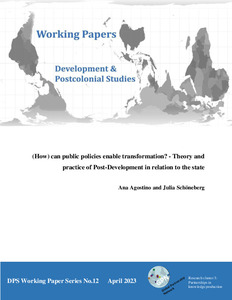Working paper

(How) can public policies enable transformation? - Theory and practice of Post-Development in relation to the state
Zusammenfassung
The Post-Development critique of ‘development’ has been around for more than 30 years now. While it is far from a homogenous school of thought, let alone practice, critical interventions of Post-Development proponents have been widely acknowledged and have punctuated mainstream debates. What is missing, however, is some closer engagement with how ideas and propositions can be translated to practice, and even more specifically, if and how they are reconcilable with logics, structures and institutions of states. In exploring the possibilities of practical applications we are departing from the assumption that any imagination of ‘good life’ cannot be connected to the logics of coloniality and capitalism. As a possible frame of action we are therefore departing from the ‘sustainability of life’ as opposed to ‘sustainable development’ in order to explore public policies in the context of social and ecological transformations.
La crítica desde el Post-Desarrollo al "desarrollo" existe desde hace más de 30 años. Aunque dista mucho de ser una escuela homogénea de pensamiento, mucho menos de práctica, las intervenciones críticas de los y las defensoras del Post-Desarrollo han sido ampliamente reconocidas y han influido en los debates dominantes. Lo que parece faltar, sin embargo, es un análisis más profundo sobre la factibilidad de que esas ideas y propuestas puedan trasladarse a la práctica y, más concretamente, si son conciliables con la lógica, las estructuras y las instituciones de los Estados. Al explorar las posibilidades de aplicación práctica, partimos del supuesto de que cualquier imaginario de una "buena vida" no puede conectarse con las lógicas de la colonialidad y el capitalismo. Como posible marco de acción, partimos de la "sostenibilidad de la vida" en contraposición al "desarrollo sostenible" para explorar las políticas públicas en el contexto de las transformaciones sociales y ecológicas.
Zitieren
@unpublished{doi:10.17170/kobra-202311249086,
author={Agostino, Ana and Schönberg, Julia},
title={(How) can public policies enable transformation? - Theory and practice of Post-Development in relation to the state},
year={2023}
}
0500 Oax
0501 Text $btxt$2rdacontent
0502 Computermedien $bc$2rdacarrier
1100 2023$n2023
1500 1/eng
2050 ##0##http://hdl.handle.net/123456789/15233
3000 Agostino, Ana
3010 Schönberg, Julia
4000 (How) can public policies enable transformation? - Theory and practice of Post-Development in relation to the state / Agostino, Ana
4030
4060 Online-Ressource
4085 ##0##=u http://nbn-resolving.de/http://hdl.handle.net/123456789/15233=x R
4204 \$dWorking paper
4170
5550 {{Uruguay}}
5550 {{Buen Vivir}}
5550 {{Post-Development}}
7136 ##0##http://hdl.handle.net/123456789/15233
<resource xsi:schemaLocation="http://datacite.org/schema/kernel-2.2 http://schema.datacite.org/meta/kernel-2.2/metadata.xsd"> 2023-11-29T09:26:15Z 2023-11-29T09:26:15Z 2023-04 doi:10.17170/kobra-202311249086 http://hdl.handle.net/123456789/15233 eng spa Namensnennung - Weitergabe unter gleichen Bedingungen 4.0 International http://creativecommons.org/licenses/by-sa/4.0/ public policy alternatives hegemony transformation good life Uruguay políticas públicas alternativas hegemonía transformación buen vivir Uruguay 300 (How) can public policies enable transformation? - Theory and practice of Post-Development in relation to the state Working paper The Post-Development critique of ‘development’ has been around for more than 30 years now. While it is far from a homogenous school of thought, let alone practice, critical interventions of Post-Development proponents have been widely acknowledged and have punctuated mainstream debates. What is missing, however, is some closer engagement with how ideas and propositions can be translated to practice, and even more specifically, if and how they are reconcilable with logics, structures and institutions of states. In exploring the possibilities of practical applications we are departing from the assumption that any imagination of ‘good life’ cannot be connected to the logics of coloniality and capitalism. As a possible frame of action we are therefore departing from the ‘sustainability of life’ as opposed to ‘sustainable development’ in order to explore public policies in the context of social and ecological transformations. La crítica desde el Post-Desarrollo al "desarrollo" existe desde hace más de 30 años. Aunque dista mucho de ser una escuela homogénea de pensamiento, mucho menos de práctica, las intervenciones críticas de los y las defensoras del Post-Desarrollo han sido ampliamente reconocidas y han influido en los debates dominantes. Lo que parece faltar, sin embargo, es un análisis más profundo sobre la factibilidad de que esas ideas y propuestas puedan trasladarse a la práctica y, más concretamente, si son conciliables con la lógica, las estructuras y las instituciones de los Estados. Al explorar las posibilidades de aplicación práctica, partimos del supuesto de que cualquier imaginario de una "buena vida" no puede conectarse con las lógicas de la colonialidad y el capitalismo. Como posible marco de acción, partimos de la "sostenibilidad de la vida" en contraposición al "desarrollo sostenible" para explorar las políticas públicas en el contexto de las transformaciones sociales y ecológicas. open access Agostino, Ana Schönberg, Julia 28 Seiten (spanische Version: 29 Seiten) Kassel, Universität Kassel, Fachbereich Gesellschaftswissenschaften Uruguay Buen Vivir Post-Development publishedVersion DPS Working Paper Series No. 12/2023 false </resource>
Die folgenden Lizenzbestimmungen sind mit dieser Ressource verbunden:


